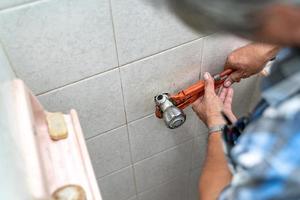Tips on How to Maintain Your Bathroom Plumbing: Essential Tips for First-Time Home Buyers
Tips on How to Maintain Your Bathroom Plumbing: Essential Tips for First-Time Home Buyers
Blog Article
They are making a number of great pointers relating to General Plumbing Tips for New Homeowners in general in this article following next.

For brand-new homeowners, understanding and keeping bathroom pipes can conserve both time and money by preventing expensive issues down the line. Right here are some necessary washroom plumbing suggestions to aid you keep everything running efficiently.
Familiarize Yourself with the Key Shut-Off Shutoff
Understanding where the major water shut-off valve is located in your house is crucial. This allows you to rapidly turn off the water supply in case of major leaks or during pipes emergency situations, protecting against extensive water damages.
Consistently Check for Leakages
Little leakages can cause big problems. On a regular basis examine under sinks, around commodes, and near plumbing fixtures for any kind of indications of leakages. Search for wetness, small drips, or corrosion. Capturing and repairing leaks early can stop more major damage and conserve water.
Do Not Ignore Slow Drains
If your sink or bathtub is draining pipes gradually, it's often an indicator of an obstruction creating. Resolving this very early can stop a complete obstruction. Use a plunger or a plumbing technician's snake to clear out particles. Prevent using chemical drainpipe cleaners as they can damage your pipelines with time.
Know What Not to Flush
Bathrooms are not garbage disposals. Prevent purging anything other than toilet paper and human waste. Things like wipes, womanly health products, and cotton bud should be taken care of in the garbage to stop obstructions and sewage system backups.
Mount Strainers in Drains
Area strainers in your sink and bathtub drains to catch hair and other debris prior to they enter your plumbing system. Cleaning up the strainers frequently will aid prevent buildup and keep water flowing freely.
Preserve Your Water Heater
Ensure your hot water heater is set to an appropriate temperature (usually around 120 levels Fahrenheit) to stop scalding and decrease power use. Flush the storage tank every year to eliminate debris accumulation, which can lower the efficiency and life-span of your heater.
Update Your Components
If your home has older fixtures, think about upgrading to a lot more effective models. Modern toilets, showerheads, and faucets are made to utilize less water while providing great stress, which can significantly minimize your water bill and ecological impact.
Be Cautious with DIY Pipes Repair Works
While it's appealing to handle all home repair services on your own, be cautious with pipes. Some problems might need specialist competence, especially if they include primary water lines or drain fixings. Employing a professional can sometimes be much more cost-efficient than DIY, specifically if it protects against more damage.
Plan For Winter
Safeguard your pipes from freezing during winter by protecting pipes in unheated areas like basements, attic rooms, and garages. During extreme chilly, let cold water drip from faucets served by exposed pipes to help avoid freezing.
Set Up Regular Upkeep
Think about scheduling annual assessments with a certified plumbing technician. They can spot issues that you could miss, such as concealed leaks or damage on pipes and fixtures. Regular maintenance assists expand the life of your pipes system and can prevent emergency situations.
Conclusion
Recognizing and maintaining your home's washroom plumbing can prevent numerous typical issues. By adhering to these necessary ideas, you can ensure your washroom stays useful and effective, saving you time and money over time.
Essential Plumbing Tips for Homeowners: Keep Your Pipes Flowing Smoothly
As a homeowner, understanding the basics of your plumbing system can save you time, money, and a lot of headaches. Plumbing issues can range from minor annoyances like dripping faucets to major problems like burst pipes that cause significant damage. This guide provides essential tips to help you maintain your plumbing system and tackle common issues.
Understanding Your Plumbing System
Supply System: Brings fresh water into your home from a municipal source or a well. Drain-Waste-Vent System: Removes wastewater and vents sewer gases outside. Fixtures and Appliances: Includes sinks, toilets, showers, dishwashers, and washing machines. Basic Maintenance Tips
Regular Inspections: Periodically check for leaks, corrosion, and other signs of wear and tear. Look under sinks, around toilets, and near water heaters. Know Your Main Shut-Off Valve: In case of a major leak, you’ll need to shut off the water quickly. Ensure everyone in your household knows where the main shut-off valve is located. Prevent Frozen Pipes: In cold climates, insulate exposed pipes and let faucets drip during extreme cold to prevent freezing. Use Strainers: Install strainers in sinks and tubs to catch hair, food particles, and other debris that can cause clogs. Common Plumbing Issues and Solutions
Clogged Drains:
Prevention: Avoid pouring grease down the drain and use drain screens to catch debris. DIY Fix: Use a plunger or a plumbing snake to clear minor clogs. For stubborn clogs, a mixture of baking soda and vinegar can sometimes help. Leaky Faucets:
Prevention: Replace washers and seals regularly. DIY Fix: Turn off the water supply, disassemble the faucet, and replace worn parts.

Contact Us Now Report this page